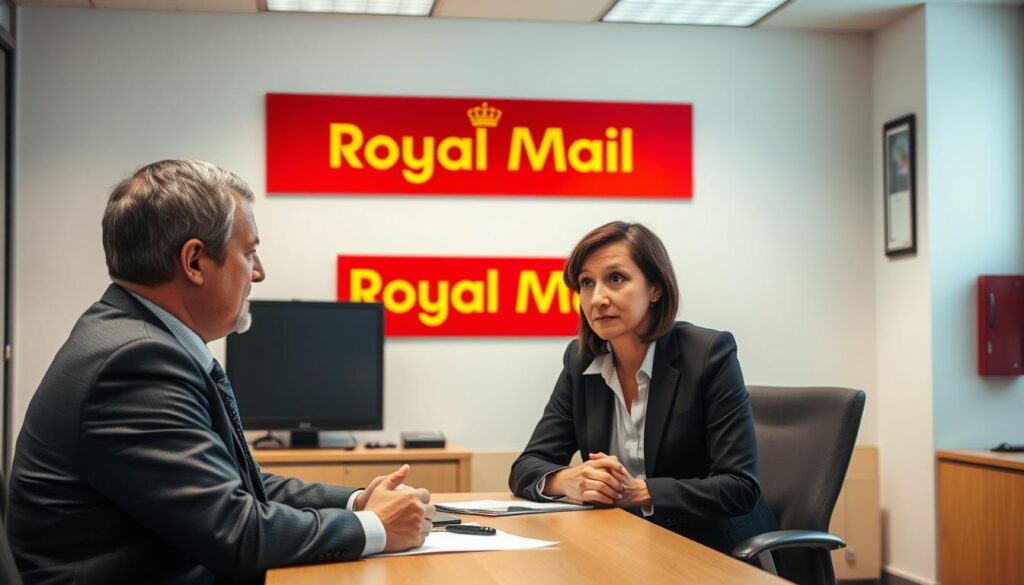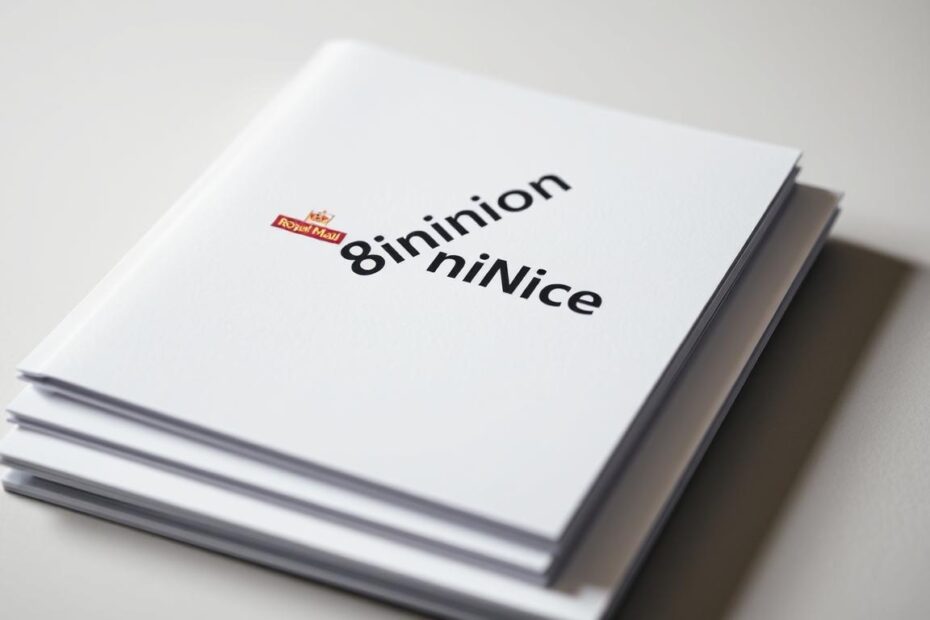Do you feel stuck at Royal Mail and want to know how to quit? Leaving a job can be hard. But knowing the right steps can make it easier.
Quitting Royal Mail needs careful planning. You might want new job chances or a change. It’s key to leave well to keep your good name.
This guide will help you through quitting Royal Mail. We’ll talk about contracts, resignation letters, and more. You’ll leave with confidence and respect.
Key Takeaways
- Understand your employment contract thoroughly before resigning
- Prepare a professional resignation letter
- Give appropriate notice to your employer
- Maintain positive relationships during your exit
- Plan your transition carefully
- Protect your professional reputation
- Be prepared for possible counteroffers
Understanding Your Employment Contract
When you leave a Royal Mail job, knowing your contract is key. It helps you leave smoothly and protects your career.
Before you quit, look over your contract carefully. This helps you know your rights and the notice period.
Review Your Terms of Employment
Your contract tells you about your job and duties. Look at these important parts:
- Job description and responsibilities
- Salary and compensation details
- Benefits and entitlements
- Termination conditions
Check Your Probation Period
Knowing if you’re in probation affects your resignation. Notice periods change based on your status.
| Employment Status | Typical Notice Period |
|---|---|
| Probationary Period | 1 Week |
| Confirmed Employee | 4 Weeks |
Know Your Notice Period
The notice period is important when you leave. You usually need to give written notice as your contract says. Always check your contract for the exact time.
Knowing these contract details helps you leave your Royal Mail job smoothly and professionally.
Preparing for Your Resignation
Deciding to leave your job at the Royal Mail is a big step. It needs careful thought. The right steps can make leaving smooth and good.
Think about why you want to leave before you do. Knowing why will help you talk about it well. It will also help you feel sure about moving on.
Assess Your Reasons for Leaving
Look at your job closely. Think about:
- Career growth limitations
- Compensation dissatisfaction
- Work-life balance challenges
- Professional development opportunities
Consider Timing Your Departure
When you leave matters a lot. It can affect how people see you and your future jobs. Think about:
| Timing Consideration | Potential Impact |
|---|---|
| Current Project Status | Complete critical assignments |
| Team Workload | Minimize disruption to colleagues |
| Personal Financial Stability | Ensure smooth financial transition |
Prepare for Possible Counteroffers
Your boss might try to keep you with better offers. Be ready with a clear, professional response. Show you know your value but stay focused on your future.
Writing Your Resignation Letter
Writing a professional royal mail resignation letter is key when you decide to leave. Your letter is an official record of your choice to leave. It also sets the tone for your exit.
A good resignation letter shows you are professional. It helps keep good relations with your employer. Before you start writing, think about these important parts for a smooth exit.
Key Components of a Resignation Letter
- Clear statement of resignation
- Specific last working date
- Brief appreciation for the opportunity
- Offer to assist with transition
- Formal closing
Formal vs. Informal Resignation Approach
Knowing the difference between formal and informal resignation is important. A formal letter is official and keeps your reputation safe.
| Formal Resignation | Informal Resignation |
|---|---|
| Written documentation | Verbal communication |
| Professional tone | Casual conversation |
| Detailed and structured | Less structured |
Resignation Letter Examples
Your royal mail resignation letter should be short and polite. Keep the tone professional and avoid negative comments about the company or colleagues. Give enough notice and thank them for the experience.
Always send your resignation letter in writing. Keep a copy for yourself. This way, you communicate clearly and protect your interests when leaving Royal Mail.
Submitting Your Resignation
Leaving Royal Mail needs a smart plan. As a postal worker, you must be careful. This helps keep your career safe and strong.
Scheduling a Meeting with Your Manager
Plan your resignation meeting well. Here are some tips:
- Ask for a private meeting with your boss
- Pick a time when they are not busy
- Be ready to talk calmly and clearly
Tips for a Productive Conversation
Stay positive and professional during the meeting:
- Be straight and clear about leaving
- Thank them for the chances you got
- Offer to help with the changeover
- Avoid saying anything bad
Next Steps After Resignation
After you leave Royal Mail, do these things:
- Write a formal resignation letter
- Set your last day of work
- Start making a detailed handover document
- Get your personal stuff back
Remember, a good resignation keeps your network strong. It also helps with future job references.
Informing Your Colleagues
Telling your team you’re leaving Royal Mail is important. How you do it can affect your reputation and future jobs.
Talking about your departure in a professional way is key. It helps keep good relationships after you leave.
Best Practices for Announcing Your Departure
- Tell your team first, then others
- Have private talks with close friends at work
- Be positive and thank them for working together
- Don’t say anything bad about leaving
Handling Reactions from Coworkers
People might react in different ways when you tell them you’re leaving. Some might be surprised, while others will support your choice.
| Potential Reaction | Recommended Response |
|---|---|
| Shock or Disappointment | Stay calm and try to reassure them |
| Curiosity about Next Steps | Share some good news, but not too much |
| Excitement for You | Thank them for their support |
Maintaining Professional Relationships
It’s important to leave with grace and professionalism. Help with the transition and keep in touch with important colleagues.
- Exchange contact info
- Connect on professional networks
- Be ready to recommend them in the future
- Stay positive and look forward
Your professional network is very important for your career.
Transitioning Your Responsibilities
When you leave a Royal Mail job, it’s important to make the transition smooth. This helps keep good relationships and makes sure things keep running well. How you hand over your tasks can really affect how you’re seen when you leave.

Getting ready to leave needs good planning and talking to others. A smooth transition shows you care about the company and are professional. It’s key to your leaving royal mail job process.
Creating a Comprehensive Handover Document
Your handover document should be clear and detailed. It should help your replacement know what to do. Make sure it includes:
- Current project status and timelines
- Key contact information
- Ongoing responsibilities and deadlines
- System access and login credentials
- Workflow processes and standard operating procedures
Training Your Replacement Effectively
When training your successor, focus on teaching them well. Use these tips for your royal mail employee exit:
- Schedule dedicated training sessions
- Provide written documentation
- Demonstrate complex tasks step-by-step
- Allow time for questions and clarifications
Finalizing Outstanding Work
Before you go, finish any work you have left. This makes the transition smoother and keeps your reputation good.
| Task Category | Action Items | Priority Level |
|---|---|---|
| Project Management | Update project tracking documents | High |
| Client Communication | Inform key stakeholders of transition | Medium |
| Administrative Tasks | Return company equipment | High |
Pro tip: Keep a positive and team spirit attitude during your transition. It will leave a good impression.
Understanding Final Pay and Benefits
When you decide to quit your Royal Mail contract, knowing your final pay and benefits is key. You need to pay close attention to the financial details of your resignation. Planning ahead is important.
Leaving a job has many financial aspects to consider. These can affect your money now and in the future. Knowing your rights during the royal mail notice period helps you make smart choices.
Salary and Leave Entitlements
Your final paycheck will include:
- Prorated salary for days worked in the final month
- Unused vacation or annual leave compensation
- Any outstanding overtime or performance-related payments
It’s important to look at your employment contract. This will tell you what money you get when you leave Royal Mail.
Pension Considerations
Your pension choices depend on a few things:
- How long you’ve worked at Royal Mail
- The type of pension scheme you’re in
- Your age and years of service
Pro tip: Talk to Royal Mail’s HR department about your pension options.
Health Insurance and Post-Employment Benefits
After leaving Royal Mail, you’ll need to find new health insurance. Think about:
- COBRA continuation coverage
- Individual health insurance plans
- Spouse’s or partner’s insurance options
Review your current benefits well. Plan for a smooth transition to keep good health coverage during your career change.
Navigating the Exit Interview

When you quit your job at the postal service, the exit interview is very important. It’s a chance to share your thoughts and keep things good with your boss.
The exit interview is more than just saying goodbye. It helps the company learn about work life, find ways to get better, and hear from those leaving.
Purpose of the Exit Interview
Knowing what the exit interview is about can help you talk better. Royal Mail talks to you to:
- Check how happy everyone is at work
- Find out if there are big problems
- Know why people are leaving
- Get ideas on how to make work better
Common Questions Asked
In your exit interview, you’ll get asked things about your job and why you’re leaving. Some common questions are:
- What made you want to look for a new job?
- Did you feel helped in your job?
- What was the work environment like?
- Do you have any ideas to make work better?
Providing Constructive Feedback
When you give feedback, be professional, honest, and helpful. Don’t criticize or get emotional. Give clear examples and ideas that can help others.
Try to leave on a good note. Help Royal Mail make work better for everyone now and in the future.
Handling References and Recommendations
After you quit your job as a postal worker, handling references is key. Your time at Royal Mail is a chance to get great recommendations. These can help you in your next job.
When you’re writing your royal mail resignation letter, think about your references. Your professional friends can really help you find new jobs.
Requesting a Reference from Your Manager
Talking to your manager about a reference needs planning. Here are some tips:
- Set up a private meeting to talk about your reference
- Share your big accomplishments while working at Royal Mail
- Ask for a written reference before you leave
- Tell them about your special contributions
Building a Positive Reference Network
It’s not just your boss who can help. Make friends with:
- Colleagues who know how hard you work
- Department heads who see your good work
- Project managers you’ve worked with
Alternatives to Traditional References
In today’s job market, think outside the box for references:
- LinkedIn recommendations
- Documents that show your skills
- Professional certifications
- Digital portfolios that show off your talents
Being smart about references can turn your postal worker job into a great next step in your career.
Exploring Your Next Steps
After you finish your royal mail exit, you’re at a big career choice. Leaving Royal Mail is not the end. It’s a chance to start a new career path and use your skills.
Looking for a new job after Royal Mail needs careful planning. Your skills in postal services are useful in many fields.
Job Search Strategies
When looking for new jobs after Royal Mail, try these tips:
- Find industries that need logistics and customer service skills
- Look for companies that work like Royal Mail
- Use professional networking sites
- Go to job fairs for your industry
Updating Your Resume and LinkedIn Profile
Make your Royal Mail job sound great on your resume and LinkedIn:
- Point out specific achievements from your job
- Use numbers to show what you’ve done
- Focus on skills like managing time and talking to customers
Networking Opportunities in Your Industry
Grow your professional network with smart networking:
| Networking Channel | Potential Benefits |
|---|---|
| LinkedIn Groups | Meet logistics and service pros |
| Professional Associations | Find jobs and learn about your field |
| Alumni Networks | Use connections from old jobs |
Your Royal Mail job is a big plus. Go into your career change with confidence and smart planning.
Reflecting on Your Experience at Royal Mail
Your time at Royal Mail is more than a job. It’s a big part of your career growth. As you leave, think about the skills and friends you made. Every challenge and win has helped you grow, readying you for what’s next.
Leaving Royal Mail is a chance to look at your career path. You’ve learned to communicate well, work as a team, and handle big tasks. These skills are valuable for your next job. Employers like people who can adapt and work hard, skills you’ve got.
Lessons Learned from Your Time There
Think about what you learned at Royal Mail. You’ve picked up skills like handling logistics and making timely deliveries. Writing down these experiences can show your strengths in job interviews. It proves you’re valuable to future employers.
How to Utilize Your Experience Moving Forward
Your time at Royal Mail makes you stand out. Update your resume to show off your skills and wins. Talk to old colleagues for job tips and references. Leaving Royal Mail is just the start of your next chapter.
Staying Connected with Former Colleagues
It’s important to stay in touch with old colleagues. Use professional networks, go to industry events, and keep in touch. These connections can open doors to new jobs, recommendations, and insights into your field.
